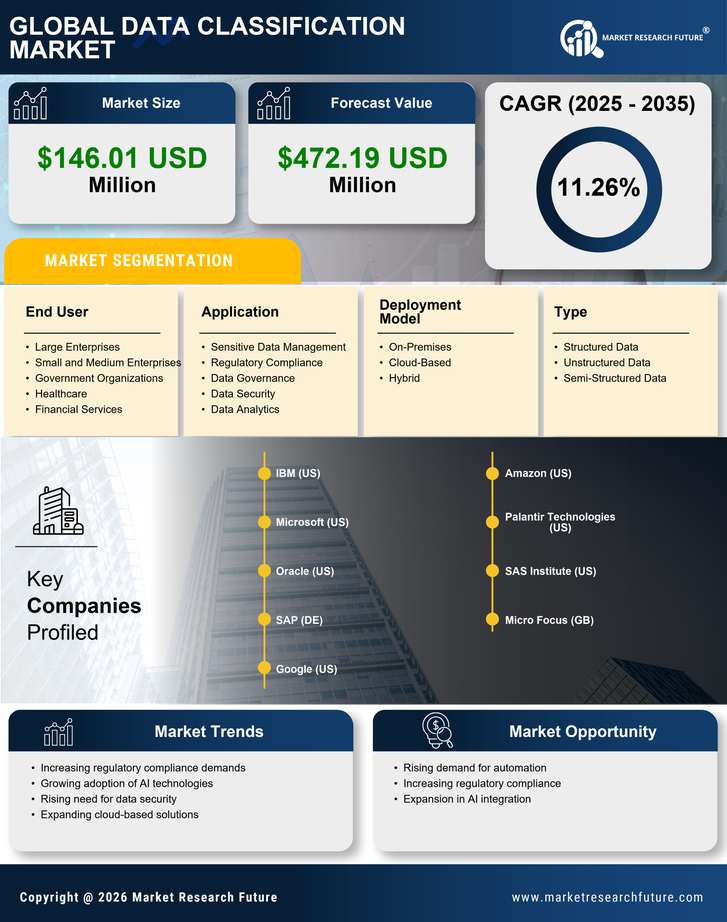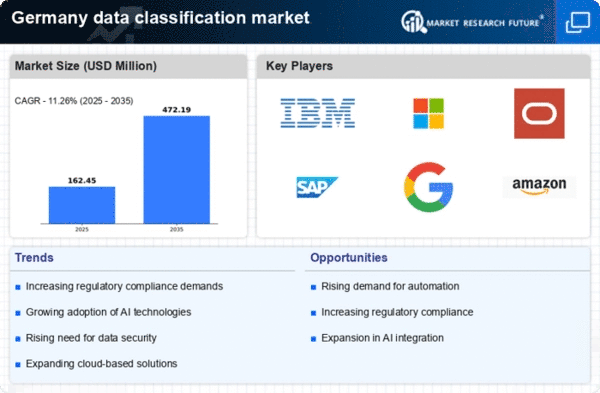Rising Data Volume
The exponential growth of data generated by businesses in Germany is a primary driver for the data classification market. As organizations increasingly rely on data for decision-making, the volume of unstructured data has surged, necessitating effective classification solutions. In 2025, it is estimated that data generation in Germany will reach approximately 100 zettabytes, highlighting the urgent need for robust data management strategies. This surge in data volume compels companies to invest in data classification technologies to ensure efficient data retrieval, compliance, and security. The data classification market is thus positioned to benefit from this trend, as organizations seek to streamline their data processes and enhance operational efficiency.
Focus on Data Governance
The increasing emphasis on data governance in Germany is a significant driver for the data classification market. Organizations are recognizing the importance of establishing clear data management policies to ensure compliance with regulations and enhance data quality. In 2025, it is expected that 60% of German companies will have formal data governance frameworks in place, which will likely drive the demand for data classification solutions. By classifying data according to established governance policies, organizations can improve data integrity and accessibility. The data classification market stands to benefit from this trend as businesses invest in technologies that support their data governance initiatives.
Adoption of Cloud Technologies
The growing adoption of cloud technologies in Germany is significantly influencing the data classification market. As businesses migrate to cloud-based solutions, the need for effective data classification becomes paramount to ensure compliance and security. In 2025, it is anticipated that over 70% of German enterprises will utilize cloud services, creating a substantial demand for data classification tools that can operate seamlessly in cloud environments. This shift necessitates the implementation of classification frameworks that can adapt to diverse data storage solutions. The data classification market is thus poised for growth as organizations seek to enhance their data governance and compliance efforts in the cloud.
Regulatory Landscape Evolution
The evolving regulatory landscape in Germany is a crucial factor influencing the data classification market. With regulations such as the General Data Protection Regulation (GDPR) imposing strict requirements on data handling, organizations must adopt effective classification strategies to ensure compliance. In 2025, it is projected that non-compliance costs for German businesses could reach €1 billion, emphasizing the need for robust data classification solutions. By implementing classification systems that align with regulatory requirements, organizations can mitigate risks and avoid substantial penalties. The data classification market is therefore likely to experience growth as companies seek to navigate the complexities of the regulatory environment.
Increased Cybersecurity Threats
The rise in cybersecurity threats in Germany has prompted organizations to prioritize data protection, thereby driving the data classification market. With cyberattacks becoming more sophisticated, businesses are compelled to implement stringent data classification measures to safeguard sensitive information. In 2025, it is projected that cybercrime costs in Germany will exceed €200 billion, underscoring the critical need for effective data classification solutions. By classifying data based on sensitivity and risk, organizations can better protect themselves against potential breaches. Consequently, the data classification market is likely to see increased demand as companies invest in technologies that enhance their cybersecurity posture and mitigate risks associated with data breaches.

















